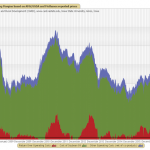Renewable Energy Group Teams Up With ExxonMobil For Cellulosic Biodiesel
Jim Lane Two giants hook up to bring cellulosic biodiesel to scale. A new source of biodiesel feedstock, and a new source of renewable fuels. In Iowa, ExxonMobil (XOM) and Renewable Energy Group (REGI) have agreed to jointly study the production of biodiesel by fermenting renewable cellulosic sugars from sources such as agricultural waste. REG has developed a patented technology that uses microbes to convert sugars to biodiesel in a one-step fermentation process similar to ethanol manufacturing. The ExxonMobil and REG Life Sciences research will focus on using sugars from non-food sources. Terms were not disclosed. Readers will...
Waste Vegetable Oil: A Slick Way to Biofuel Your Portfolio
In August, I argued that Biodiesel stocks could be in trouble from more efficient ways to turn the oils and fats they use as feedstock into fuel, and concluded the article by saying that the likely winners are suppliers of oils and fats, not the processors. James Kingsdale, of Energy Investment Strategies has been thinking along the same lines. Last week he wrote an excellent overview of the major biofuels industries, including some stock picks. One of those stock picks was the diamond in the rough I wish I had known about when I wrote Biodiesel's Nightmare: Renewable Diesel...
Neste Renewable Diesel Capacity Hits 2 Million Tons But Feedstock Constraints Loom
Finland’s Neste Oil Corporation
(NEF: F)
brought its fourth renewable diesel plant on-line in September 2011,
earning bragging rights to the world’s largest facility of its
kind. Located at the Port of Rotterdam, the plant has the
capacity to produce 800,000 metric tons of renewable diesel that
Neste brands NExBTL and claims is the “cleanest and highest-quality
renewable diesel on the market today.” Along with Neste’s
three other plants already in operation in Finland and Singapore the
fourth plant in Denmark brings Neste’s total production capacity to
2.0 million metric tons per year.
Biodiesel’s Nightmare: Renewable Diesel
Until algae farms move from the research and demonstration stage, biodiesel usage is going to be tightly constrained by available feedstock. The feedstocks for biodiesel are oils and fats, which naturally occur in quantity only in animals or the seeds of plants. As such, the quantity of oil available is much smaller than the sugars, starches, and cellulose which occur not only in the seeds and fruits of plants, but also in the stems and leaves, and can be used to make ethanol. Because sugarcane contains the best ethanol feedstock, sugar in the stem (not just the...
A Decade Of Unexpected Curves In The Bioeconomy
By Jim Lane
Over the years we’ve all seen a lot of curveballs in the advanced bioeconomy. You see companies like Valero, which lobby the United States Congress with unbridled intensity to get rid of the Renewable Fuel Standard, on the verge of becoming the single-biggest producer of RINs in the United States (with news that they might take capacity at Diamond Green Diesel up to 540 million gallons).
You see companies like Solazyme which love the Renewable Fuel Standard and drive up to nearly a billion-dollar post-IPO valuation based on delivering fuels at volume, then announcing that there are even...
Darling’s Renewable Diesel Diamond
In July 2013, Darling Ingredients (DAR: NYSE) and its joint venture partner Valero Energy (VLO: NYSE) commissioned the largest facility in North America to convert waste animal fats into renewable diesel. The facility was strategic located adjacent to Valero’s petroleum refining installation in Norco, Louisiana.
At the time the facility was capable of pumping out 12,000 barrels of renewable diesel per day that could be dropped directly into Valero’s distribution network and blended with fossil fuel. Even at that production level the facility showed promise to deliver strong dividends back to its owners. The partners named their venture Diamond Green Diesel and celebrated the unparalleled achievement.
The two partners in Diamond Green...
FutureFuel Profits Preview
by Debra Fiakas CFA Biodiesel and biochemical producer FutureFuel Corporation (FF: NYSE) will report fourth quarter 2015 financial results after the market close today. No conference call will be held due to low attendance on recent calls. The single published estimate for FutureFuel is for $0.28 in earnings per share on $122.5 million in total sales. Despite an increase in this estimate in the last week, the number still represents a significant decrease in earnings compared to the prior-year period. The Company has missed the consensus estimate in both of the last two quarters and we do not...
Fretting Over FutureFuel
by Debra Fiakas CFA Earlier this week FutureFuel Corporation (FF: NYSE) reported financial results for the second quarter ending June 2015. Sales of the company’s biodiesel and specialty chemical products increased 53.7% to $104.6 million compared to the prior-year quarter when reported revenue was $68.0 million. The company delivered a profit as usual, but traders appeared unimpressed. The stock gapped lower on the news and two days later set a new 52-week low price. Granted net income was lower year-over-year by 30.9%, coming in at $3.8 million or $0.09 per share. A closer look...
Interview With Dan Oh, CEO Of Renewable Energy Group
Jim Lane Leading a series this week, “The Strategics Speak", in which we’ll look at what a number of major strategic investors see in the landscape relating to industrial, energy and agricultural investment, Biofuels Digest visited with Dan Oh, CEO of Renewable Energy Group (REGI), which has long been the US’s leading independent biodiesel producer but in recent years has steadily diversified and expanded operations. In many ways, REG is the entire industrial biotech business in a nutshelll. They’re fermentation (through REG Life Sciences), and thermocatalytic (through REG Geismar and their extensive biodiesel business). They use both...
Will Petrosun’s Algae Biodiesel Grow on Investors?
by Tom Konrad Celluslosic Ethanol is all the rage. A less noticed, but significant "Biofuel 2.0" is biofuel based on algae. Follow the Biomass As I have consistently argued (see these recent articles on John Deere, Biogas, Cellulosic Ethanol vs Biomass Electricity, and Renewable or Green Diesel) the people most likely to make money from biofuel are not the processors and distributors (who compete directly with petroleum or other fossil fuel-based products, and so have little pricing power), but the producers of feedstock, which, like oil, is in very limited supply, and so they will have pricing power....
Renewable Energy Group’s New CEO: C.J. Warner
by Jim Lane
In Iowa, white smoke has emerged from the Renewable Energy Group (REGI) conclave: Tesoro EVP and former Sapphire Energy CEO C.J. Warner has been named chief exec of Renewable Energy Group, at a pivotal moment for biodiesel in Washington and around the world and amidst a boom for renewable diesel like the world has never seen.
REG has been making good progress with Wall Street under interim CEO Randy Howard and its share price has been on the rise, and the plants have been humming along nicely churning out hundreds of millions of gallons of biodiesel and the liquid gold...
Soladiesel Algae Fuel is a Monster Hit
Jim Lane Sales increase 35 percent at participating test sites and survey results reveal driver preference for algae-based Soladiesel over conventional fuels. In California, Propel Fuels and Solazyme (SZYM) announced that sales grew by 35 percent at Propel stations, offering SoladieselBD in a B20 blend during a 30-day retail pilot program, compared to non-test sites. The pilot was conducted at Propel’s Clean Fuel Points in Redwood City, San Jose, Berkeley, and Oakland. In addition, a follow-on consumer preference study with Propel’s customers found 92 percent of participants noted that they would be more likely to...
Renewable Energy Group Profits Exceed Subsidies
by Debra Fiakas CFA Earlier this month biodiesel producer Renewable Energy Group, Inc. (REGI: Nasdaq) reported a tidy profit of $22.3 million on record $1.0 billion in total sales. Reported net income was $43.5 million, including accounting treatments for corporate recapitalization undertaken in the year. Results from 2012 were noteworthy on a couple of counts. It was the first time in the company’s ten-year history (including years of operation among predecessor firms) that sales exceeded $1.0 billion. REGI produced 188 million gallons of biodiesel from a variety of feedstock, including non-edible corn oil, used...
Amyris hits the comeback trail
Jim Lane Biofene production starts up in Paraiso, Brazil – sales expected to commence in Q1 2013 – Total, Temasek, Biolding inject fresh capital. What’s next for biofuels’ “Comeback Kid”? By now, most of the “smart set” that found itself excited about Amyris (AMRS), and about advanced synthetic biofuels during the IPO fever, have moved on. They read Dan Grushkin’s “The Rise And Fall Of The Company That Was Going To Have Us All Using Biofuels” in Fast Company, wrote off Amyris and possibly the entire sector, and presumably migrated their enthusiasm to low-cost natural gas, battery...
A (nearly) Pure-play Biodiesel Stock
On January 29th, M~Wave and private vertically integrated Biodiesel distributor Blue Sun Biodiesel announced a merger between the two, with Blue Sun becoming a division of M~Wave, and the merged company being renamed Blue Sun Holdings. Managerial control will also pass to "certain directors and the officers of SunFuels." If this merger goes through as planned in the second quarter of 2007, US investors will have their first opportunity to invest in a stock focused on a biofuel which is much less controversial among environmentalists than corn-based ethanol. Estimates of the well-to-wheels Energy Return on Energy Invested...
Hither and Yon: Transmission and Biofuels
In the most recent two installments of Energy Tech Stocks' interview with me cover my views on transmission stocks, and biofuel stocks. Readers of AltEnergyStocks know that I am a big fan of electricity transmission, a theme I keep coming back to. You also know that I have a very ambivalent relationship with both ethanol and biodiesel. So I liked Bill's transmission article, but I just wasn't able to convey to him the subtleties of how I feel about biofuels. But he got one thing right: the owners of biofuel feedstock are likely going to be the biggest winners....




